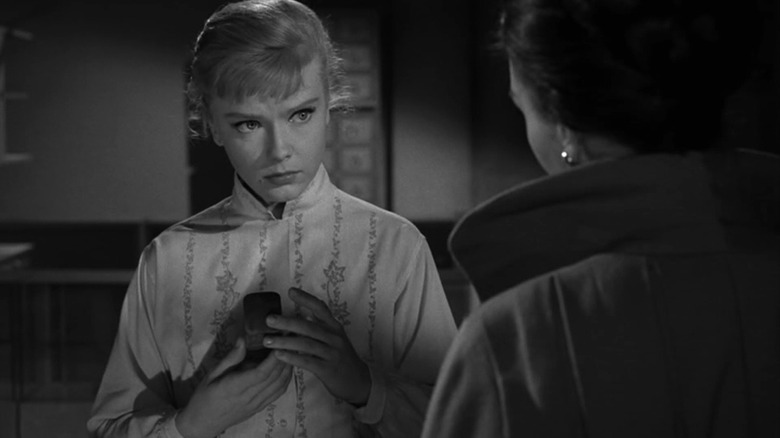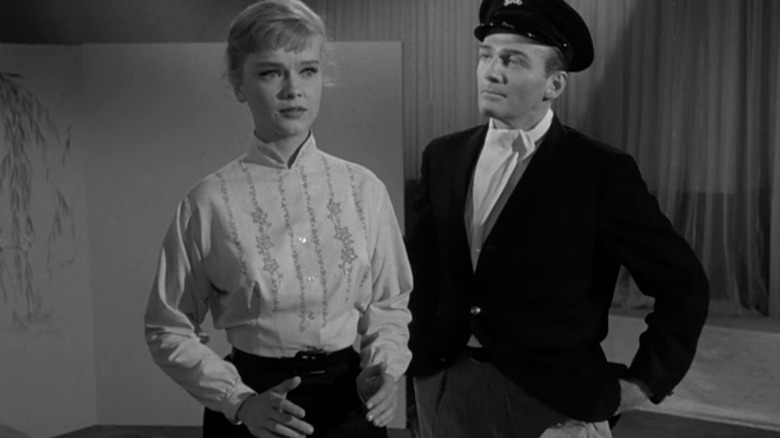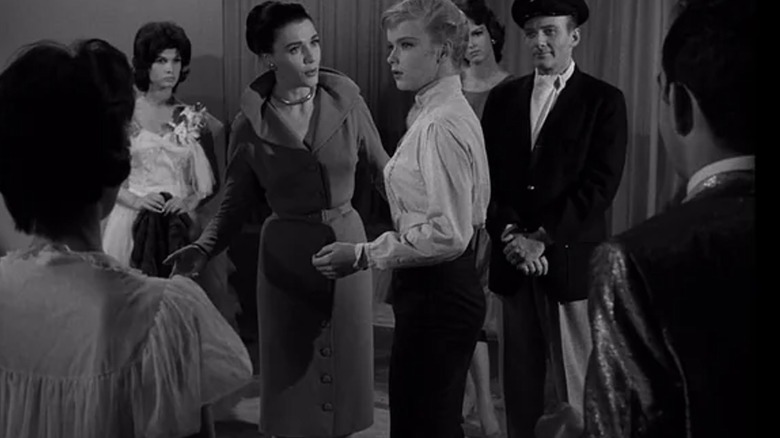This Chilling Episode Of The Twilight Zone Taps Into The Heart Of Terror
This post contains spoilers for "The After Hours."
The innate human fear of being lost in an unknown, empty space can never be properly explained or quantified. This fear that makes us acutely aware of our fragility, and the foreignness of the space, be it inside an abandoned building or out under the vast night sky, adds to the anxiety of being alone without ever knowing if we are truly alone. In "The After Hours," the 34th episode of "The Twilight Zone," a woman suddenly finds herself in an empty departmental store after dark, its bustling daytime charm and security evaporating and molding into deathlike silence once night falls. As a woman trapped in an indoor space with seemingly no exits, this woman, Marsha, experiences horrors beyond her comprehension, as this unwitting trip to the Twilight Zone is the key to unlocking her sense of identity and the fears attached to it.
"The After Hours" poses intriguing questions that simmer beneath a story that seems run-of-the-mill or not interesting enough — it uses the journey of an inanimate object attainting temporary bursts of sentience to underline the nuances of autonomy, personhood, visceral fears, and commodification in a hypercapitalist era. Even before the climactic twist occurs, the sheer dread Marsha experiences is easily transmitted to the audience, as the feeling of being present in a space that should not exist becomes more palpable with time. There are tons of horror tales and creepypastas about liminal spaces that are designed to trigger fear or non-existent elevator floors that contain unimaginable horrors, but "The After Hours" employs this concept on the subtlest, simplest level to evoke an unsettling feeling that frightens us because of how realistic and commonplace it is.
Let us dive into "The After Hours" and why it still scares and intrigues.
This Twilight Zone episode compels us to question who we are
"The After Hours" begins with a rather mundane occurrence: Marsha White (Anne Francis) travels to the ninth floor of a departmental store to buy a golden thimble as a gift for her mother. This journey to the ninth floor occurs by chance, as Marsha uses a suspiciously empty elevator (as opposed to the perpetually crowded ones), and this trip leads to a dark, empty floor with a saleswoman who guides her to the golden thimble, the only object in the room. This is rather eerie, of course, and she goes to another floor to talk about this odd experience but is baffled to learn that the ninth floor does not exist.
What happens next is pure nightmare fuel: Marsha gets accidentally locked inside the store after hours, and the mannequins around her seem ... alive. They move subtly enough for her to question her sanity, haunting her with their semi-sentient expressions and resemblances to actual people she encountered at the store during the day, such as the elevator operator she met earlier. This harrowing sequence is shot with sudden cuts and zooms to mannequin heads and mirrors, consciously evoking a doppelganger effect that makes us realize the truth about Marsha and the fact that she has no choice but to revert to her non-personhood. This point is driven home with a shot of her crying for help through a frosted glass window, her defining features blurring until she is reminded of her core mannequin status.
Although "The Twilight Zone" closes its episodic narration with a warning about the true nature of people around us, the implications of an inanimate person gaining temporary personhood only to lose it time and again seem to be a more impactful takeaway from this chilling episode.
Losing agency in a consumerist world
"The After Hours" is a sharp, uncomfortable glimpse into the commodification of human existence, where the negation of the self is encouraged to help pursue something that is packaged as innate or voluntary — a prerequisite for rampant consumerism.
Comparisons between Marsha and Barbie are inevitable, and the former's genuine belief in her humanity makes her eventual fate seem unjust, even cruel. Sure, every mannequin needs to avail the chance to be human for a while, but Marsha's immersion and conviction in her identity as a woman paints the heartbreaking picture of autonomy robbed. She is chastised for forgetting her "true" nature: she is a mannequin, a wooden commodity used to fuel consumerism for flesh-and-blood humans, and her aspirations toward personhood are scoffed at and actively discouraged. The loss of agency here is startling, as the fellow mannequins seem to grin with glee after she returns to her core state, as if happy to have stifled her newfound love for life, and the dreams of being more than a doll at a store.
The state of horrifying panic that Marsha experiences before this loss is the opposite end of a similar fear in "Where Is Everybody?," another "The Twilight Zone" episode that underlines the terror of being the only person in an abandoned space (in this case, a ghost town). This desperate, helpless brand of loneliness is enough to cause one to experience a mental breakdown, but "The After Hours" includes the added terror of being perceived by objects that should remain inanimate but don't. Mannequins are classic vehicles to induce jumpscares in horror, but the episode hones in on this fear by surrounding Marsha with her own kind, twisting the knife by situating them as harsh reminders that shatter her illusion of being "real."


